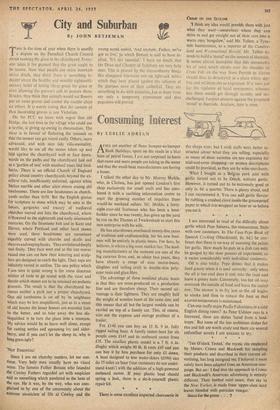Consuming Interest
By LESLIE ADRIAN A ',TER yet another of those bumper-to-bumper Bank Holidays, spent on the roads in a blue haze of petrol fumes, I am not surprised to learn that more and more people are taking to the water and that the small-boat manufacturers are having a boom.
I talked the other day to Mr. Murray Meikle, who, in Chelsea, has just opened London's first shop exclusively for small craft and has com- bined it with a yachting information centre to meet the growing number of inquiries from would-be weekend sailors. Mr. Meikle, a forty- eight-year-old Scotsman who has been a boat- builder since he was twenty, has given up the yard he ran on the Thames at Twickenham to start this new enterprise with his wife.
He has also thrown overboard twenty-five years of tradition and craftsmanship, for his new busi- ness will be entirely in plastic boats. For here, he believes, is where a big mass market lies. The lead- ing manufacturers at the moment are one of the big caravan firms and, in under two years, they have already a range of nine motor-boats, dinghies and sailing craft in double-skin poly- ester resin and glass fibre.
The advantage of these moulded plastic boats is that they are mass-produced on a production line and are therefore cheap. Their second ad- vantage is their lightness. They are roughly half the weight of wooden boats of the same size, and this means that all but the largest models can be carried on top of a family car. This, of course, cuts out the expense and storage problem of a trailer.
For £140 you can buy an 11 ft. 9 in. fully rigged sailing boat. A family motor-boat for six people costs £145 and its outboard motor from £38. The smallest plastic model is a 7 ft. 6 in. dinghy which weighs 90 lb. It costs £45 and you can buy it by hire purchase for only £5 down. A boat designed to tow water-skiers (£196) can do 35 miles an hour ('our customers do not under- stand knots') with the addition of a high-powered outboard motor. If your plastic boat should spring a leak, there is a do-it-yourself plastic repair kit.
There is some excellent imported charculerie in
CRIME ON .THE SKYLINE.
'I think my idea would provide them with just what they want—somewhere where they can drive in and get straight out of their cars into a warm cosy bungalow,' said Mr. Talbot, a Tyne- side businessman, to a reporter of the Cumber- land and. Westmorland Herald. Mr. Talbot • in- tends to build a `motel' on the summit of Hartside. It seems. almost incredible that this memorable bit of road which climbs over the shoulder of Cross Fell on the way from Penrith to Alston should thus be desecrated at a place where sky- line and wildness are so important. If it were not for the vigilance of local newspapers, schemes like these would get through secretly and un- challenged. bexpect protests against the proposed 'motel' at Flartside. Anyhow, here is mine.'
the shops now; but I wish staffs were better in- structed about -what= they are selling, especially as many of .these varieties are .too expensive for trial-and-error shopping----or written descriptions could be provided, as they are by wine merchants.
What I bought as a Belgian pork pate with garlic turned out to be Dutch, without garlic. However, it turned out to be extremely good at only Is. 8d. a quarter. There is plenty about, and I can recommend it. You can add garlic flavour by rubbing a crushed clove inside the greaseproof paper in which it.is wrapped an hour or so before you eat it. • ' * , * I am interested to read of the difficulty about garlic which Pepe Solsona, the restaurateur, finds with new customers. In The Casa Pepe Book of Spanish Cooking (Macdonald, 8s. 6d.) he con- fesses that' there is no way of assessing the palate for garlic. How much he-puts in a dish can only be gauged by the slow process of experimerit, as it varies considerably with individual customers.
Oil is also tricky. Pepe denies that it makes food greasy when it is used correctly: only when the oil is too cool does it sink into the food and leave a greasy taste. Conversely, too hot oil may overcook the outside of food and leave the centre raw. The answer is to fry just as the oil begins to smoke and then to reduce the heat so that an even temperature is maintained.
Can one really enjoy PaellaValenelana in a cold English dining room? As Peter Ustinov says in a foreword, these are dishes 'lured from a land- scape.' But Some of the less ambitious dishes for rice and fish are worth study and there are Several unfamiliar sauces I am anxious to try.
'Ten O'clock Tested,' the mystic rite employed by Messrs. Crosse and Blackwell for sampling their products and described in their current ad- vertising, has long intrigued me. I believed it must surely have been adapted from an American cam- paign. But no : I find that the approach in Crosse and Blackwell' s American advertising is entirely different. Their bottled mint sauce, they say in the New Yorker, is made from 'upper-class mint leaves blended with patrician vinegar.'
Sauce for the goose' . ..?






























 Previous page
Previous page